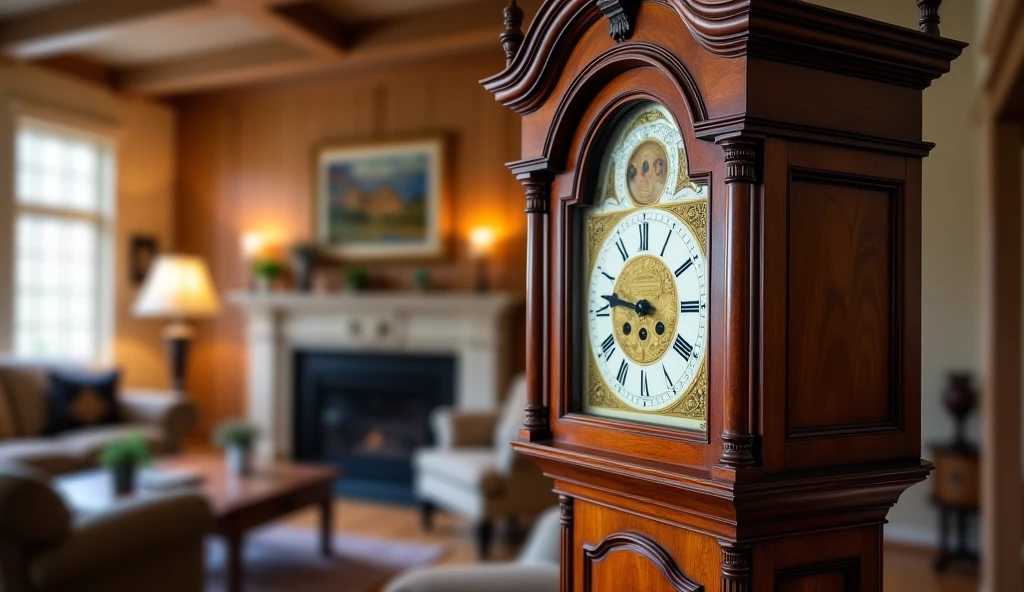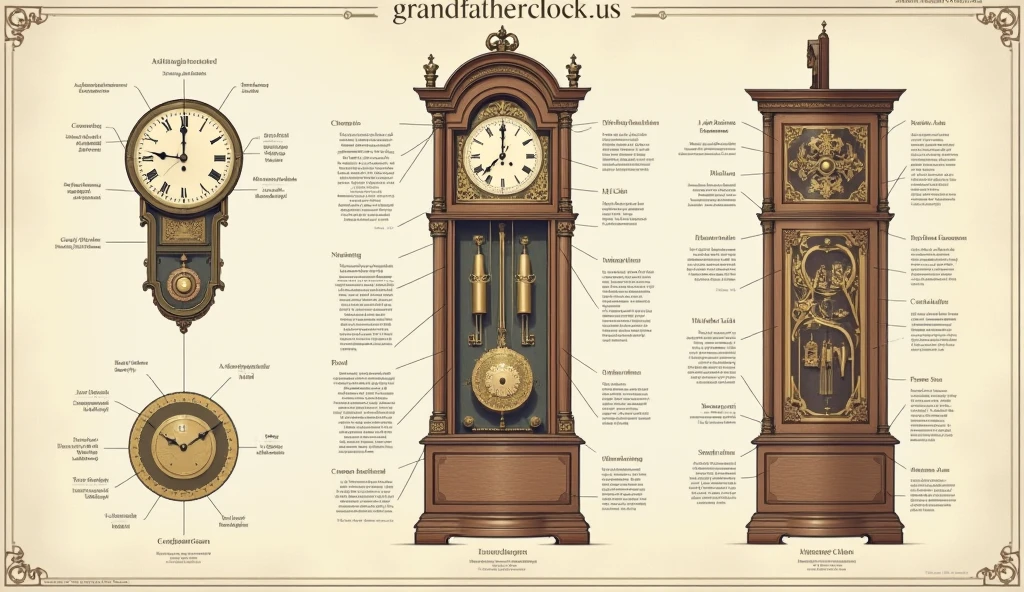1. What is a Grandfather Wall Clock and How Does It Differ from Other Clocks?

A Grandfather Wall Clock is a type of tall, mechanical clock that is designed to be mounted on a wall. It typically features a pendulum mechanism and a chime system, often producing the familiar “ding-dong” sound at regular intervals. Unlike other wall clocks, Grandfather Clocks are characterized by their larger size, intricate designs, and the presence of a swinging pendulum, which distinguishes them as a piece of both functional and decorative furniture.
2. How Does the Pendulum Work in a Grandfather Clock?
The pendulum in a Grandfather Clock is part of the timekeeping mechanism. It swings back and forth, regulating the movement of the clock’s gears and ensuring accurate timekeeping. The length and weight of the pendulum determine how fast it swings. The clock’s escapement mechanism controls the energy flow from the weights, which in turn powers the pendulum’s motion. This ensures that the clock maintains consistent time intervals.

3. What Are the Different Types of Grandfather Clocks?
There are several types of Grandfather Clocks, each with unique features:
- Traditional Mechanical Clocks: Powered by weights and a mechanical movement, requiring winding to operate.
- Battery-Powered Clocks: These use batteries instead of a mechanical system, but still retain the aesthetic of traditional grandfather clocks.
- Regulator Clocks: Known for their precise timekeeping, these clocks were historically used in observatories and scientific labs.
4. How Do You Set the Time on a Grandfather Clock?
Setting the time on a Grandfather Clock involves turning the minute hand clockwise until the correct time is reached. If it has a pendulum, make sure it’s swinging properly. To avoid damaging the movement, avoid forcing the hands if they don’t move smoothly. Some clocks may have a separate dial for setting the chime and strike times, so ensure these are synchronized as well.
5. What Are the Common Problems Faced by Grandfather Clocks?
Some common problems with Grandfather Clocks include:
- Timekeeping Issues: If the clock is running fast or slow, it could be due to a misadjusted pendulum or an unbalanced weight system.
- Chime Malfunctions: The chime may stop working if the mechanism becomes misaligned or the strike rod is blocked.
- Dirt and Dust Build-up: Over time, dust can accumulate inside the clock, affecting the movement. Regular cleaning is necessary to ensure smooth operation.
- Worn-out Parts: The mechanical parts inside can wear out, especially in older clocks, leading to malfunctions.
6. How Often Should You Wind a Grandfather Clock?
Mechanical Grandfather Clocks should typically be wound once a week to keep them running smoothly. Winding the clock too often or not enough can lead to issues. The winding key is usually located at the base of the clock, and the clock should be wound until resistance is felt. Ensure to follow the manufacturer’s instructions regarding winding to prevent damage.
7. What Is the Role of the Chime Mechanism in a Grandfather Clock?
The chime mechanism in a Grandfather Clock serves to strike a series of notes on a set of chime rods, signaling the time at regular intervals (usually every quarter hour, half hour, or hour). Some clocks play a melody like Westminster, while others might play custom chimes. The chime mechanism is often separate from the timekeeping mechanism but works in harmony to enhance the experience of owning the clock.
8. How Can You Clean and Maintain a Grandfather Clock?
Cleaning and maintaining a Grandfather Clock requires careful attention to avoid damaging the delicate components.
- Dusting: Use a soft, lint-free cloth to dust the exterior regularly.
- Cleaning the Glass and Wood: For wood, use a polish recommended for fine furniture. Clean the glass with a glass cleaner or a damp cloth.
- Oil the Movement: The mechanical movement should be lubricated periodically (about every 3-5 years) by a professional clock technician to keep the gears working smoothly.
- Check the Pendulum: Ensure the pendulum is centered and moving smoothly. Adjust the length if needed to correct the time.
9. What Is the Average Lifespan of a Grandfather Clock?
The lifespan of a Grandfather Clock can vary depending on the quality of the materials used and how well it’s maintained. With proper care and regular maintenance, a high-quality mechanical Grandfather Clock can last for decades, with some even being passed down through generations. The movement may need professional servicing every 5 to 10 years, but the clock itself can often last for over 100 years.
10. How Can You Identify the Value of a Grandfather Clock?
The value of a Grandfather Clock depends on several factors:
- Brand and Manufacturer: Well-known brands like Howard Miller, Hermle, or Grandfather Clock makers with a long history typically command higher prices.
- Age and Condition: Antique clocks, particularly those in excellent condition or with original parts, tend to be more valuable.
- Movement and Features: Clocks with complex movements, such as chiming systems and handcrafted woodwork, may increase the clock’s value.
- Market Demand: Like other antiques, the value can fluctuate depending on current trends and demand.
Each Grandfather Clock is unique, and its value will depend on a combination of these factors. A professional appraiser or clockmaker can provide a more accurate assessment based on the clock’s specific characteristics.